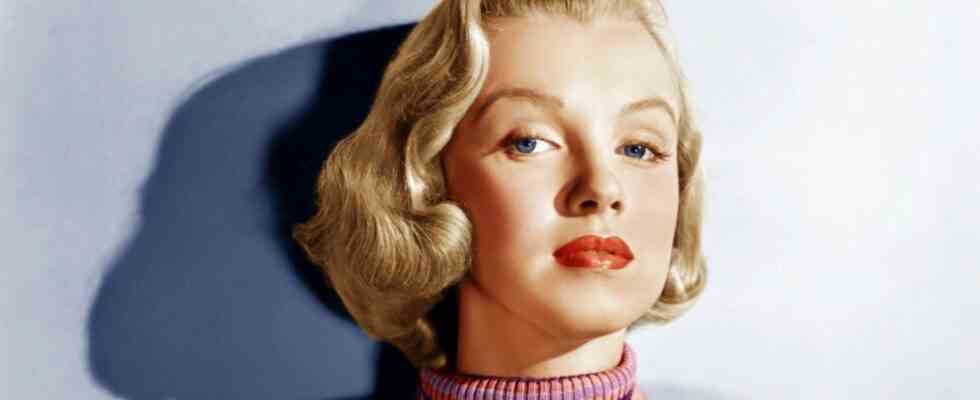Now she speaks herself: Marilyn from the inside
Much has been written about Marilyn Monroe, only she rarely gets a chance to speak. When she died in 1962, she left behind a treasure chest of interior views: exercise books and hotel stationery, she scribbled down whatever went through her head, poems, thoughts, self-incantations. American director Liz Garbus has these notes for her documentary “Love, Marilyn” (2012) used – which works because Glenn Close and Viola Davis, Marisa Tomei and Uma Thurman lend their voices to Monroe. “Love, Marilyn,” currently on Prime, is a seismograph of the soul. In her own words, Marilyn Monroe seems to dominate the perception of the fictional character she created, yet remains lost behind her. “Love, Marilyn” is melancholic like a summer that is coming to an end. Susan Vahabzadeh
A strange therapist: Dr. Sharifi is mostly interested in herself: Cover of “Work-Live-Balance”.
(Photo: Reproduct)
Young, hip, exploited: “Work-Life-Balance” by Aisha Franz
They are young, work in hip jobs, but their working conditions are precarious: sculptor Anita earns her money with everyday ceramics, which she sells in online shops; Sandra is so bored as a “Graduate Database Strategist” that she tries her hand as an influencer and sexually abuses a colleague; and the programmer Rex has his ideas stolen by a “friend”. The brave new world of work, from Aisha Franz in her comic “work-life balance” (Reproduct) tells, is cuddly and woke with ergo beanies and compulsory slippers in the office, but the battles over distribution are possibly even more violent than they used to be. Exploitation and the pressure to self-improve wear the millennials down – which is why Anita, Sandra and Rex find themselves in the practice of the strange Dr. Land Sharifi, who is primarily interested in herself. Aisha Franz has a great eye for false facades, which she caricatures in scrawled drawings. A funny book about nasty relationships. Martina Knoben
Difficult farewell: the band “Fettes Brot”
A few questions about this whole process: Did Schiffmeister always look like he was wearing one of those mustache and fake nose disguise goggles? Is the sublime grey-haired Doctor Renz finally the George Clooney of German hip-hop? Where can you find the “very expensive sunglasses” (he about her) behind which King Boris is said not to be hiding tears? And what in God’s name is this nonsense about the resolution? What?! Fat bread are therefore history, therefore future history, there is still a farewell tour and then no more bread. “Papa and papa and papa are breaking up” and I’m sure they have good reasons for it. It’s still wrong. You would have needed this band. But good: If it has to be, then of course with such a perfectly imperfect song and video like “Brot doesn’t cry”. We rather do. Bye. Jacob Biazza
The three goddesses from “White Flag” – Meirhaeghe, Gumbodete, Vittucci.
(Photo: Philip Frowein)
Benny Claessens’ “White Flag”
When Benny Claessens started to design evenings at the theater himself – don’t worry, he’s still an actor, soon at the Berlin Volksbühne – he liked to sing a song of praise to love. For example, when he sang it together with Risto Kübar at the Munich Kammerspiele (2013), he sang with the presence of his body, with and above all without words. Later he turned more to making fun of the mechanisms of the German municipal theatre, full of irony and self-reflection. He was completely a diva, but at the same time continued to search for and find tenderness in the theater, withdrew, only staged without acting himself. Like “White Flag”, a stage poem that has now been released at the Neumarkt Theater in Zurich, as part of the city’s theater spectacle and in co-production with Opera Ballet Vlaanderen.
He doesn’t even have to play here, he has three wondrous people representing him, Challenge Gumbodete, born in Zimbabwe, Teresa Vittucci, currently one of the most important representatives of a Swiss dance scene that doesn’t care about differences between genders and origins, and Benjamin Abel Meirhaeghe , which is probably best described as a permeable medium. Together, the three of them are only present in their fantastically outfitted essence, they tell in English about queer everyday life and Carrara marble as indispensable in the interior design, such over-the-top stuff that seems completely natural. They are surrounded by Schmaz, the gay men’s choir Zurich, 26 guys who sing Nico’s “These Days” in doo-wop style, but also completely enchanting Schubert songs and at the end with “Wochenend und Sonnenschein” the audience in a lost idea of a dismissed by light nature.
“White Flag” is anti-agitation theater with an evil, crude core, around which the longing for comprehensive tenderness develops. As their antithesis, the three act as goddesses or ancient heroines who kill their children or otherwise spill blood that is absorbed by the pink flokati. This creates the dream of a new beginning, in which everyone wipes away their tears while dancing. Magically weird. Egbert Tholl

